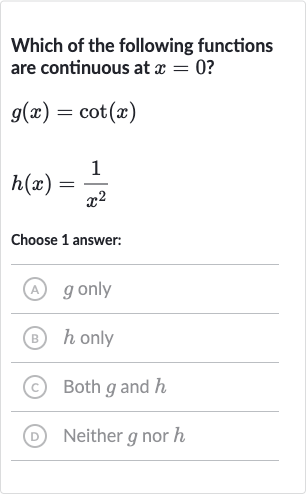Full solution
Q. Which of the following functions are continuous at ?Choose answer:(A) only(B) only(C) Both and (D) Neither nor
- Check Continuity at : To determine if the functions are continuous at , we need to check if they are defined at and if their limits as approaches exist and are equal to the function value at .
- Consider : Let's first consider . The cotangent function is the reciprocal of the tangent function, which means . Since the tangent of is , has a vertical asymptote at , which means it is not defined at . Therefore, is not continuous at .
- Consider : Now let's consider . As approaches , the denominator approaches , which makes the function value approach infinity. Therefore, the limit of as approaches does not exist, and is not continuous at .

